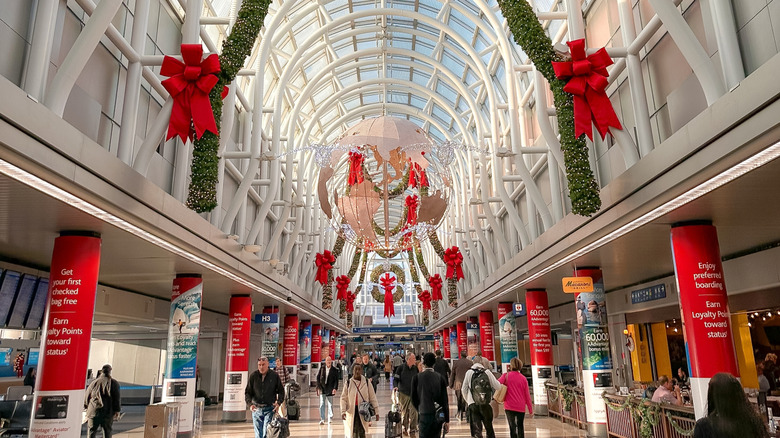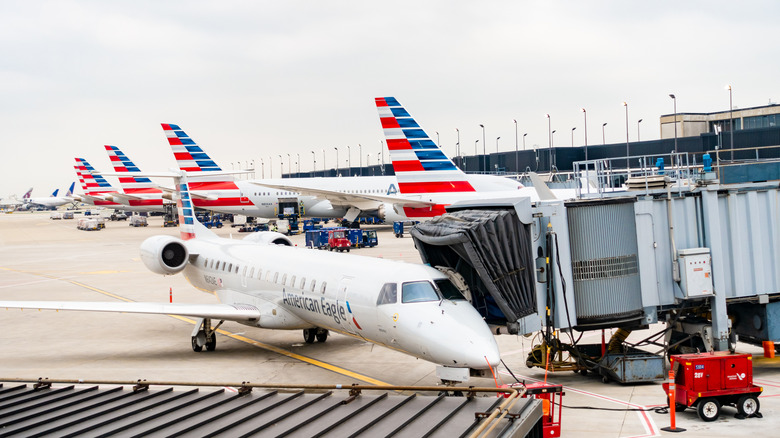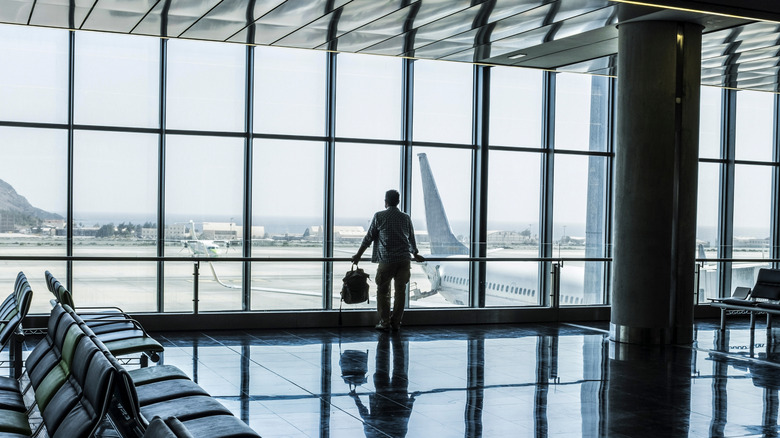A Popular Midwest Airport Is The Most Likely In America To Experience Winter Delays
The holidays are a time for family, friends, and festive celebrations, but for many, they also involve the stress of winter travel. There's nothing quite like the frustration of a flight delay or, worse, a cancellation, especially when you're eager to reunite with loved ones. Between 2023 and 2024, there were over 370,000 weather-related delays across the U.S., inflicting significant economic damage nationwide. There are five U.S. airports where travelers can expect frequent delays during the holiday season, but travelers heading to or through the Midwest this winter should be particularly mindful of one hub: Chicago O'Hare.
Known for its hustle and bustle, O'Hare also has the unfortunate distinction of being the most delay-prone airport during the winter months, with 42% of flights experiencing delays (via CNN). Winter weather disruptions at O'Hare can pose challenges to your holiday plans, whether you're departing, arriving, or connecting through the airport.
O'Hare International Airport, located on Chicago's northwest side, has been a cornerstone of U.S. aviation since its opening in 1944. Covering more than 7,200 acres, it remains one of the world's busiest airports, serving an estimated 15 million passengers annually and averaging 585 flights per day. Despite its prominence as a holiday transit station, O'Hare is not immune to the challenges posed by Midwest weather.
Chicago O'Hare is a winter travel hub
Despite its accessibility and international reach, Chicago O'Hare grapples with some of the harshest weather-related delays in the nation. Data from the Weather Channel highlights that O'Hare experienced over 261,000 weather-related delays over the past decade — the highest among all major U.S. airports. As one of the few airports in the world offering flights to every inhabited continent, O'Hare's global significance makes these disruptions even more impactful for travelers.
The reasons are as varied as they are predictable. Chicago's winter weather features an average of 28 snowy days annually, along with 38 thunderstorm days and 13 foggy days. These conditions create a perfect storm for flight disruptions. The infamous "Windy City" moniker is no exaggeration; strong gusts, even on sunny days, frequently exacerbate delays. In extreme cases, weather has brought O'Hare to a standstill. For example, in 2012, a dense fog resulted in more than 100 canceled flights and 300 delayed departures. In November 2024, there were also significant disruptions, so O'Hare's reputation as a challenging winter travel hub persists.
Proactive tips for winter travel
If your holiday plans include flying through O'Hare (or any airport prone to winter delays) being prepared is essential. Start by monitoring your flight status closely the day before and the day of travel, using text alerts or your airline's app for real-time updates. Even if your flight is delayed, arrive at the airport early, as schedules can shift unexpectedly. Use this extra time to charge devices or grab a meal, especially at O'Hare, which is one of the U.S. airports with the longest security line wait times. To minimize complications, opt for direct flights whenever possible, as layovers increase the risk of delays.
In case of disruptions, stay calm and seek assistance from an airline representative either at a kiosk or by phone. Know your rights — significant delays or cancellations may entitle you to refunds or compensation, so keep all receipts and familiarize yourself with airline policies. Leverage tools like FlightAware for live updates and insights, as their Misery Map provides a nationwide delay overview. For added peace of mind, invest in travel insurance that covers delays and cancellations.
Holiday travel can be challenging, especially with unexpected disruptions. However, by staying informed, planning ahead, and staying calm, you can navigate the season's challenges and make your journey smoother. If you encounter problems, you can secure a fast refund for your next canceled or delayed flight to minimize inconvenience and recoup costs.


